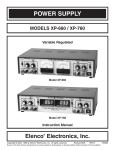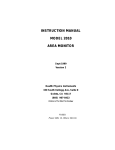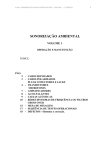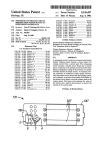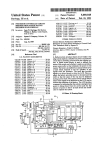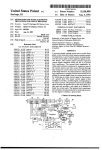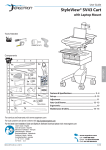Download Elenco Electronics XP-650 Instruction manual
Transcript
VARIABLE REGULATED POWER SUPPLY MODELS XP-650 / XP-750 Model XP-650 Model XP-750 Instruction Manual Elenco Electronics, Inc. Copyright © 1989 Elenco Electronics, Inc. Revised 1998 REV-D 753650 Table of Contents Safety Precautions Specifications Operating Instructions Introduction Circuit Description Power Source 0-20V or 0-40V Regulators XP-750 Digital Meters Maintenance and Calibration Variable 0-20VDC Regulator Calibration Variable 0-40VDC Regulator Calibration Digital Meter Calibration on Model XP-750 Parts List XP-650 Parts List XP-750 Schematic Diagram XP-650 Schematic Diagram XP-750 -1- Page Page Page Page Page Page Page Page Page Page Page Page Page Page Page Page 2 2 3 3 3 4 4 5 6 6 6 6 7 8 9 10 Safety Precautions CAUTION: When removing cover or replacing fuse, always disconnect the power cord from the AC socket. Service repair should be done by qualified personnel who are knowledgeable of electrical hazards. Certain safety precautions must be observed when this power supply is used with external circuits that are connected to AC power lines. There is always some danger when working with electrical equipment or circuits that operate at hazardous voltages. You should thoroughly familiarize yourself with the equipment before working on it. High voltage may appear at unexpected points in defective equipment. Elenco power supplies are equipped with three wire line cords which ground the chassis to the power line cord. DO NOT CUT OFF OR DISABLE THE GROUND PLUG. The power supply secondary circuits are isolated from the 120V primary circuit via the power transformer. When working with the other equipment, this may not always be the case. Always be familiar with the equipment rating. Keep in mind that defective equipment can have dangerous voltages at unexpected points. Specifications for Model XP-650 Input Voltage Output Voltage Output Current Load Regulation Line Regulation Ripple and Noise Current Protection Short Protection Output Impedance Meter 120VAC or 240VAC (factory set) 0-20VDC or 0-40VDC 3 Amps @ 0-20VDC 1.5 Amps @ 0-40VDC Less than .1V (0 to full load) Less than .1V (105 to 135V) Less than .005V RMS .05 to 3A adjustable current limit .05 to 3A limit automatic reset .025 ohms 40 Volts and 3 Amps, 5% full scale accuracy Specifications for Model XP-750 Input Voltage Output Voltage Output Current Load Regulation Line Regulation Ripple and Noise Current Protection Short Protection Output Impedance Meters 120VAC or 240VAC (factory set) 0-20VDC to 0-40VDC 3 Amps @ 0-20VDC 1.5 Amps @ 0-40VDC Less than .1V (0 to full load) Less than .1V (105 to 135V) Less than .005V RMS .05 to 3A adjustable current limit .05 to 3A limit automatic reset .025 ohms Two LED type meters. The voltmeter accuracy is better than 1/2% +1 digit. Resolution is 100mV. The ammeter accuracy is better than 1% +1 digit. Resolution is 10mA. -2- Operating Instructions 1. Check the voltage rating of the equipment to be powered. Care must be taken not to exceed this rating. 2. Plug the line cord into a 120V 60Hz AC outlet. 3. Set the voltage switch to 0-20V if the voltage required is under 20V. This assures cool operation of the heat sinks. Adjust the voltage control to the desired voltage. Load variation will have practically no effect on the voltage setting due to the special regulation circuit. 4. Connect the positive lead of your equipment to the red output terminal and the negative lead to the black terminal. The power should be turned off during this operation. 5. Adjust the current limiting control to maximum counter-clockwise position. Switch your equipment on. The overload light will glow if more than 50 milliamps is drawn. Increase this control until the light goes out and stays out during normal use. Your equipment is now protected from high current surges. An alternate method of adjusting current limiting is to short the output and adjust the current to a desired value. Remove the short. This will now limit the current to your setting. Introduction The Model XP-650 and XP-750 are solid-state DC power supplies, continuously variable from 0 to 40 volts. Two current ranges are available, 0-20V @ 3 amps and 0-40V @ 1.5 amps. The units are precisely held to the desired output voltage by a special regulating circuit. Maximum output current is externally adjustable from .05 to 3 amps. An overload indicating lamps glows when current approaches limiting conditions. This circuit is designed to protect the power supply against shorts or excessive demand. It also protects the equipment from possible damage due to high surge currents. This supply is ideal for use in school labs, service shops or anywhere a precise DC voltage is required. Circuit Description The Elenco Models XP-650 and XP-750 use the same power and regulator circuits. The only difference is in the display functions. The Model XP-650 uses a 0-40V and a 0-3A analog meter. Model XP-750 has two digital meters to read voltage and current. The voltmeter has better than 1/2% accuracy. The current meter has better than 1% accuracy. Both models basically have two independent regulated power supplies. These supplies, when placed in series, will give 0-40 volts @ 1.5 amps. When they are placed in parallel, the output voltage will be 0-20 volts @ 3 amps. The basic circuits of these supplies consist of 1) The power source, 2) The regulator and 3) The readout circuits. These circuits are shown in Figure 1 and will be discussed in detail in the following paragraphs. Figure 1 Block Diagram of 0-20V Power Supply -3 3- Power Source The power source in both the XP-650 and XP-750 consists of two transformers T1 and T2 and two diode bridges, D1 to D4 and D5 to D8. C3 and C5 are the filter capacitors. Switch S2 places these supplies in series to produce about 50VDC output or in parallel to produce about 25VDC out. A negative 25 volts is produced with diodes D9, D10 and capacitors C1 and C2. This negative voltage is regulated with zener diodes D11 and D15. The negative voltage is needed to stablilize the regulators and allow zero output voltage. Figure 2 Simplified Regulator Circuit 0-20V or 0-40V Regulators Figure 2 shows a simplified circuit of the regulator circuit. This circuit consists of a high gain amplifier transistor Q1. The gain of this stage is over 100,000 because of its extremely high load impedance. This load consists of a current source transistor Q2 and its biasing circuit. The effective resistance of this circuit is over 500,000 ohms. Transistor Q7 is a power device that controls the output current. Transistors Q5 and Q6 are emitter followers used to prevent loading of the current source. Transistors Q1, Q5, Q6, Q7 and resistors R10 and VR4 form a closed negative feedback loop. If you analyze this loop, you will find that the output voltage goes negative. This reduces the current in transistor Q1 and thus the collector voltage will increase, returning the output voltage to very near its original value. The high gain is essential to keep the output voltage constant. Diode D12 is added to prevent drift with temperature changes and to allow the output voltage to go to zero. To protect the regulator from overload and short circuit, transistor Q4 is added. Whenever the voltage drops across resistor R10 reaches .6V, transistors Q4 and Q9 will conduct and lower the collector voltage of amplifier Q1. To obtain variable current limiting, transistor Q4 is pre-biased via resistor R5 and VR3. This will allow the output current to limit between .05 and 3 amps. Transistor Q3 is added to light the overload LED. Switch S2C sets the maximum output voltage to 0-20 or 0-40VDC by adjusting variable resistors VR1 or VR2. Maximum current limiting is set by switch S2D. Resistors R10 and R11 are used to limit the 0-40V current to 1.5 amps. When resistors R12 and R13 are added to the circuit, the maximum current is increased to 3 amps. -4- XP-750 Digital Meters The Model XP-750 uses two digital meters, one for output voltage and one for output current. The input to the voltmeter comes from a 1000:1 voltage divider, R101 and R102 on the power supply output. Thus, the voltmeter input will be 1mV for a 1V output voltage. Since the meter sensitivity is 10 counts per mV, the meter will read 010. The decimal point is fixed by a jumper wire on the meter so that the output appears as 01.0 volts. The ammeter input comes from a .01 ohm shunt resistor in series with the output current. The input is thus 10mV (100 counts) for a 1A output current. The ammeter decimal point is set to the 2nd place so that the meter reads 1.00 amps. Meter Operation METERS - Meter operation centers around the 7107 integrated circuit (IC). This chip contains a dual slope A/D (analog to digital) converter, display latches, seven segment decoder, and display drivers. The input of the 7107 IC is fed to an A/D converter. Here, the DC voltage is changed to a digital format. The resulting signals are processed in the decoders to light the appropriate LED segments. Timing for the overall operation of the A/D converter is derived from a 40kHz external oscillator. The IC divides this frequency by four and the resulting clock pulses are used to drive its decade counters. It is then further divided to form three convert-cycle phases. The final readout is clocked at about 2.5 readings per second. The digitized data is presented to the display as four decoded digits (seven segments) plus polarity. The decimal point position on the display is determined by a jumper wire on each meter PC board. A/D CONVERTER - Any given measurement cycle performed by the A/D converter can be divided into three consecutive time periods, autozero (AZ), integrate (INTEG) and read. A counter determines the length of the time periods. The integrate period is fixed at 1000 clock pulses. The read period is a variable time that is proportional to the unknown input voltage. It can vary from zero counts for zero input voltage to 2,000 counts for a full scale input voltage. The autozero period varies from 1,000 to 3,000 counts. For an input voltage less than full scale autozero gets the unused portion of the read period. During the autozero cycle, the accumulated offset voltage errors in the converter are measured and stored as a voltage on the external autozero capacitor. This voltage is used to correct for the offset voltage errors during the read cycle. During the INTEG cycle, the INTEG capacitor is charged up for 1,000 clock pulses (100ms.), see Figure 3. The charging rate is determined by the unknown input voltage. At the end of the integrate cycle the voltage on the capacitor is proportional to the unknown input voltage. During the read cycle, the INTEG capacitor is discharged at a constant rate. The time required for the discharge is therefore proportional to the unknown input voltage. This time is converted to a digital format by counting the number of clock pulses that occur during the discharge. Counter Output Figure 3 Dual Slope A/D Converter -5- Maintenance and Calibration The Elenco Models XP-650 and XP-750 have been designed and manufactured to require no routine maintenance. The circuits are protected by design from external shorts or overloads. The following information is provided in the event the supply requires service or re-calibration. Variable 0-20VDC Regulator Calibration 1) Connect an accurate digital meter to the output terminals. 2) Set the voltage control to the maximum position and switch to 0-20V. 3) Adjust the variable resistor VR1 for 20.0V. Variable 0-40VDC Regulator Calibration 1) Connect an accurate digital meter to the output terminals. 2) Set the voltage pot to maximum position and voltage switch to 0-40V position. 3) Adjust the variable resistor VR2 for 40.0V. Digital Meter Calibration for Model XP-750 1) Note the small pot (R2) on the top of each meter’s PC board. This is the GAIN pot which controls the accuracy of the meter. 2) To set the accuracy of the meter you need another very accurate digital meter. Connect this meter to measure the voltage on the output terminals. Set the voltage switch to 0-40V position and set the output to 30VDC. Adjust the voltmeter GAIN pot for 30.0 volts on the XP-750 meter. 3) To set the accuracy of the ammeter connect a suitable load to the output and connect the accurate digital meter to measure the current on the load. Set the voltage switch to 0-20V and set the output current to 2.0 amps. Adjust the ammeter GAIN pot for 2.00 amps on the XP-750 ammeter. -6- Parts List XP-650 Qty Description Resistors Part # Qty 106803 122200 132000 132201 133300 134700 141000 141001 141200 141800 144700 153900 161000 191516 192413 192511 ! ! ! ! ! ! ! ! ! ! ! ! ! ! ! ! ! ! ! ! ! ! ! ! ! ! ! ! ! ! ! ! ! ! ! ! ! ! ! ! ! ! ! ! ! ! ! ! ! ! ! ! ! ! 4 1 1 1 1 2 2 1 1 1 1 1 1 2 1 1 .68Ω 5% 2W 22Ω 5% 1/4W 200Ω 5% 1/4W 220Ω 5% 1/2W 330Ω 5% 1/4W 470Ω 5% 1/4W 1KΩ 5% 1/4W 1KΩ 5% 1/2W 1.2KΩ 5% 1/4W 1.8KΩ 5% 1/4W 4.7KΩ 5% 1/4W 39KΩ 5% 1/4W 100KΩ 5% 1/4W Pot 10KΩ Trim Pot 1KΩ Panel Pot 10KΩ Panel ! ! ! ! ! ! ! 1 1 1 1 1 1 2 .001µF (102) .1µF (104) 25V Lytic 10µF 50V Lytic 100µF 35V Lytic 160µF 330V Lytic 470µF 35V Lytic 3300µF 50V ! ! ! ! ! ! 5 2 1 1 8 1 1N4001 1N4148 1N5240 1N5246 1N5401 LED ! ! ! ! 2 2 4 1 A70 2N3055 MPS 5172 2N6121 Capacitors 231036 251010 271057 281046 281629 284746 293347 Diodes 314001 314148 315240 315246 315401 350002 Transistors 320070 323055 325172 326121 -7- 2 1 1 1 1 1 1 1 1 1 2 2 1 3 1 1 1 1 2 2 1 1 1 4 12 2 4 5 2 2 5 4 4 1 2 4 1 1 Description Miscellaneous Transformer PC Board Fuse 2A Switch Slide Switch Illuminated Voltmeter 40V Ampmeter 0-3A Cover Chassis Meter Bracket Heatsink Knob Bushing Strain PC Board Stand-off Binding Post Black Binding Post Red Binding Post Green LED Lens Cable Tie Screw 4-40 x 1/4” Screw 4-40 x 3/8” Screw 4-40 x 3/4” Screw 8-32 x 1/4” Screw 8-32 x 3/8” Screw 6 x 3/8” Nut Hex Pot Nut 4-40 Nut 8-32 Flatwasher 8mm x 14mm Flatwasher 1/8” x 1/4” Lockwasher 5/16” Lockwasher #4 internal Lockwasher #8 external Lug Solder #8 Butt Connector Feet Rubber Fuse Holder Line Cord Part # 440400 510650 530200 541190 541204 571040 573003 611071 611650 613015 615001S 622009 624003 625002 625031 625032 625033 626012 628982 641430 641435 641480 641830 641840 642660 644101 644400 644800 645101 645600 646101 646401 646828 661002 661100 662001 663001 862105 Parts List XP-750 Qty Description Resistors Part # Qty 106803 122200 125005 132000 132201 133300 134700 141000 141001 141200 141800 141801 144700 153900 161000 171000 191516 192413 192511 897120 ! ! ! ! ! ! ! ! ! ! ! ! ! ! ! ! ! ! ! ! ! ! ! ! ! ! ! ! ! ! ! ! ! ! ! ! ! ! ! ! ! ! ! ! ! ! ! ! ! ! ! ! ! ! ! ! ! 4 1 1 1 1 1 2 3 1 1 1 1 1 1 1 1 2 1 1 1 .68Ω 5% 2W 22Ω 5% 1/4W 50Ω 10% 5W 200Ω 5% 1/4W 220Ω 5% 1/2W 330Ω 5% 1/4W 470Ω 5% 1/4W 1KΩ 5% 1/4W 1KΩ 5% 1/2W 1.2KΩ 5% 1/4W 1.8KΩ 5% 1/4W 1.8KΩ 5% 1/2W 4.7KΩ 5% 1/4W 39KΩ 5% 1/4W 100KΩ 5% 1/4W 1MΩ 5% 1/4W Pot 10KΩ Trim Pot 1KΩ Panel Pot 10KΩ Panel Shunt Wire .01Ω ! ! ! ! ! ! ! ! ! 1 1 1 1 1 1 1 1 2 .001µF (102) .1µF (104) 25V Lytic 4.7µF 50V Lytic 10µF 50V Lytic 100µF 35V Lytic 160µF 300V Lytic 220µF 35V Lytic 470µF 25V Lytic 3300µF 35V ! ! ! ! ! ! 5 2 1 1 8 1 1N4001 1N4148 1N5240 1N5246 1N5401 LED ! ! ! ! 2 2 4 1 A70 2N3055 MPS 5172 2N6121 Capacitors 231036 251010 264757 271057 281046 281629 282246 284745 293347 Diodes 314001 314148 315240 315246 315401 350002 Transistors 320070 323055 325172 326121 Integrated Circuits -8- 1 1 2 1 1 1 1 1 1 1 1 2 1 3 1 1 1 1 1 1 2 1 4 12 2 3 5 2 2 4 3 5 1 2 4 1 1 Description Miscellaneous Display Amps Display Voltage Transformer PC Board Fuse 2A Switch Slide Switch Illuminated Cover Chassis Heatsink Heatsink Clip-on Knob Bushing Strain PC Board Stand-off Binding Post Black Binding Post Red Binding Post Green LED Lens Screw 2-56 x 3/4” Screw 4-40 x 3/8” Screw 4-40 x 1/2” Screw 8-32 x 1/4” Screw 8-32 x 3/8” Screw 6 x 3/8” Pot Nut 7mm Nut 4-40 Nut 8-32 Flat Washer 8mm x 14mm Lockwasher 5/16” internal Lockwasher #2 Internal Lockwasher #4 internal Lockwasher #8 external Lug Solder #8 Butt Connector Feet Rubber Fuse Holder Line Cord Part # 355614MA 355614MV 440400 510650 530200 541190 541204 611071 611750 615001S 615003 622009 624003 625002 625005 625006 625007 626012 641233 641435 641465 641830 641840 642660 644101 644400 644800 645101 646101 646200 646401 646828 661002 661100 662001 663001 862105 160µF 330V -9- 50V 50V Schematic Diagram XP-650 160µF 330V 50V -1050V Schematic Diagram XP-750 WARRANTY POLICY All of our instruments have been tested and conform to our rigid requirements on performance and durability, they are guaranteed to be free of defects in workmanship, materials and construction for a period of 2 years. If this product should fail in normal use within the first 3 months from the date of purchase, Elenco will repair or replace the unit at no cost. For the remainder of the warranty period, a nominal service charge is required to cover shipping and handling. Elenco will either repair or at its sole option, replace any part except for fuses, probes, lamps, batteries and other optional materials which are defective in either workmanship or material under normal and proper use. When returning merchandise for repair, please include proof of purchase, a brief letter of explanation of problem and sufficient packing material. Before returning any merchandise, please call our service department at 847-541-3800 to obtain a return authorization number (RMA). Direct all warranty inquiries to: Elenco Electronics, Inc. • Service Department 150 West Carpenter Avenue, Wheeling, IL 60090 • Phone: (847) 541-3800 Elenco Electronics, Inc. 150 W. Carpenter Avenue Wheeling, IL 60090 (847) 541-3800 http://www.elenco.com e-mail: [email protected]












